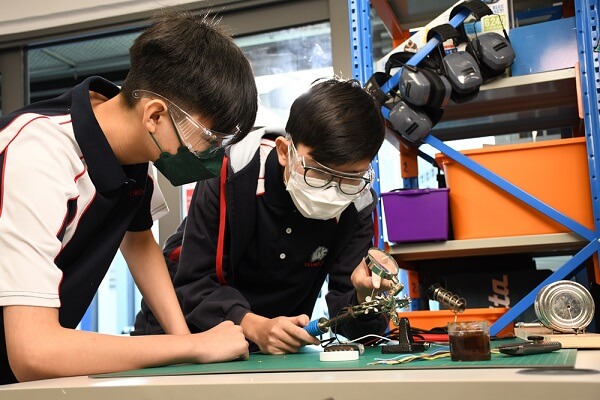Unlocking Potential: Experiential Learning in Action

Experiential learning is a teaching philosophy that emphasizes the importance of firsthand experiences, active engagement, and reflection to facilitate learning. Unlike traditional lecture-based methods, experiential learning encourages students to explore concepts and ideas through a combination of real-world experiences, discussions, and self-assessment. This approach creates a more dynamic and interactive learning environment, which can lead to deeper understanding and long-lasting knowledge retention.
The Importance of Experiential Learning in Education
In today’s rapidly changing world, the ability to adapt, innovate, and think critically has become increasingly crucial. As a result, experiential learning is gaining recognition as a valuable educational approach that can help students develop these essential skills. Through hands-on experiences and reflection, learners can better understand complex concepts, cultivate creativity, and develop a growth mindset that encourages lifelong learning.
Experiential Learning and Unlocking Student Potential
Enhancing Critical Thinking and Problem-Solving Skills
One of the primary benefits of experiential learning is its ability to foster critical thinking and problem-solving abilities in students. By engaging in real-world challenges and working through obstacles, learners can develop essential cognitive skills and a deeper understanding of the subject matter. This active involvement allows them to identify patterns, draw connections, and consider multiple perspectives – essential components of effective critical thinking.
Encouraging Creativity and Innovation
Experiential learning also plays a significant role in nurturing creativity and innovation among students. By providing opportunities for learners to experiment, take risks, and explore new ideas, experiential learning schools empower students to think outside the box and develop innovative solutions to complex problems. This creative process not only enhances their understanding of the material but also prepares them for future success in an increasingly competitive and fast-paced world.
Promoting Emotional Intelligence and Empathy
Another crucial aspect of experiential learning is its emphasis on emotional intelligence and empathy. By participating in collaborative activities, students can develop their interpersonal skills and learn to appreciate diverse perspectives. This understanding of others’ feelings and experiences fosters empathy, which is a crucial component of emotional intelligence and contributes to effective communication, collaboration, and conflict resolution.
Fostering Resilience and Adaptability
Finally, experiential learning can help students develop resilience and adaptability by exposing them to challenging situations and teaching them how to learn from their mistakes. Through trial and error, learners can build the confidence needed to tackle new challenges and develop the flexibility to adapt to changing circumstances. These qualities are essential for navigating the complexities of modern life and fostering personal and professional success.
The Role of Experiential Learning in Online Homeschool Programs
The Growing Popularity of Online Homeschooling
In recent years, online homeschooling has emerged as a popular alternative to traditional education, offering students and their families greater flexibility and control over their learning experience. As a result, many online homeschool programs are incorporating experiential learning strategies to provide a more engaging and effective education for their students.
Integrating Experiential Learning in Virtual Classrooms
To successfully incorporate experiential learning in an online homeschool setting, educators must employ creative strategies that facilitate hands-on experiences and reflection. This can include virtual simulations, project-based learning, and real-world assignments that encourage students to apply their knowledge and skills in practical situations. Additionally, online discussion forums, video conferencing, and collaborative tools can help facilitate reflection and social interaction among students.
Examples of Experiential Learning Activities in Online Homeschool Programs
Many online homeschool programs have developed innovative ways to incorporate experiential learning in their curricula. For instance, students might participate in virtual science labs, where they can conduct experiments and explore scientific principles in a simulated environment. In another example, learners might engage in project-based learning assignments that require them to research a topic, collaborate with their peers, and present their findings to the class. These types of activities not only promote experiential learning but also foster a sense of community and connection among online homeschool students.
Benefits of Experiential Learning in Online Homeschool Programs
Personalized Learning Experiences
One of the primary advantages of incorporating experiential learning into online homeschool programs is the opportunity for personalized learning experiences. Students can explore their interests and passions through projects and activities that align with their unique learning styles and goals. This personalized approach not only enhances engagement and motivation but also helps students develop a sense of ownership and agency in their education.
Real-World Application and Relevance
Experiential learning emphasizes the importance of connecting educational content to real-world situations and applications. By engaging in hands-on activities and projects that have practical relevance, students can gain a deeper understanding of the material and develop the skills needed to succeed in the workforce and beyond. This focus on real-world application makes the learning experience more meaningful and relevant for students, ultimately preparing them for future success.
Collaboration and Social Interaction
Although online homeschool programs can sometimes lack the social interaction found in traditional school settings, integrating experiential learning can help bridge this gap. By providing opportunities for students to collaborate on projects, engage in discussions, and participate in group activities, online homeschool programs can foster the development of essential social skills and create a sense of belonging among students.
Continuing Developments and Innovations
As the importance of experiential learning continues to gain recognition, educators and institutions will likely seek new and innovative ways to integrate this approach into their curricula. Technological advancements, such as virtual reality and artificial intelligence, may provide new opportunities for experiential learning in both traditional and online homeschool settings. By embracing these innovations, educators can further enhance the learning experience and better prepare students for the challenges of the 21st century.
The goal of experiential learning is to instill in students a love of learning and a commitment to lifelong personal and professional growth. By fostering curiosity, creativity, and adaptability, experiential learning helps students develop the skills and mindset needed to thrive in an ever-changing world. As educational approaches continue to evolve, the emphasis on experiential learning will remain a critical component of effective teaching and learning for students of all ages.





